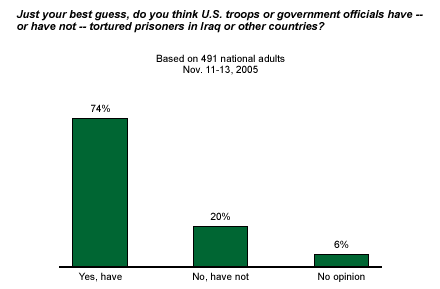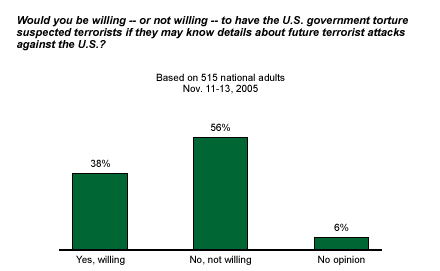"We do not torture," President George W. Bush said earlier this month as he defended the United States' anti-terrorism interrogation practices. Last week, CIA Chief Porter Goss echoed Bush's declaration, denying his agency tortures prisoners. But most Americans think otherwise. Further, most would be unwilling to sanction torture, even if it could potentially yield information about future terrorist attacks against the United States.
Has It Happened?
A CNN/USA Today/Gallup poll*, conducted Nov. 11-13, finds nearly three-quarters of Americans (74%) think that U.S. troops or government officials have tortured prisoners in Iraq and other countries.

Majorities of both Democrats and Republicans believe U.S. troops and government officials have tortured prisoners in Iraq and elsewhere. However, Democrats are more likely than Republicans to believe torture has taken place, 80% vs. 65%, respectively.
Majority Not Willing to Allow Torture
In October, responding to revelations of prisoner mistreatment in Iraq's Abu Ghraib prison and allegations of mistreatment at the U.S. detention center at Guantanamo Bay, the Senate passed a ban on the torture of prisoners in U.S. custody. Because some interrogation techniques would be restricted under the ban, the Bush administration is arguing for an exemption for CIA-held prisoners if preventing a terrorist attack is at risk.
The Nov. 11-13 survey asked Americans whether they would be willing to have the government torture suspected terrorists if they may know details about future terrorist attacks against the United States. Slightly more than one in three, 38%, say they would be willing to have U.S. officials torture suspected terrorists, while the majority (56%) say they would not be willing.

Again, there is a schism along party lines. Just 27% of Democrats say they would be willing to have the government torture suspected terrorists if there's reason to believe they have information about future attacks, compared with slightly more than half of Republicans (51%).
*These results are based on telephone interviews with randomly selected national samples of 491 and 515 adults, aged 18 and older, conducted Nov. 11-13, 2005. For results based on this sample, one can say with 95% confidence that the maximum error attributable to sampling and other random effects is ±5 percentage points. In addition to sampling error, question wording and practical difficulties in conducting surveys can introduce error or bias into the findings of public opinion polls.
